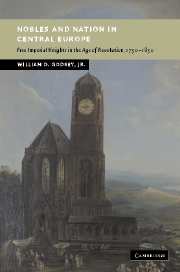Book contents
- Frontmatter
- Contents
- Preface
- Abbreviations
- Introduction
- 1 Wealth and noble autonomy: the Free Imperial Knights in Mainz on the eve of revolution
- 2 Nobles becoming Germans: the transformation of a concept
- 3 Nobles becoming Germans: the destruction of a “geo-cultural landscape”
- 4 Between destruction and survival: knights on the Middle Rhine 1750–1850
- 5 The past recaptured: knights in the Hapsburg Empire 1792–1848
- 6 From cathedral canons to priests: the Coudenhoves and the “Catholic revival”
- 7 The beginnings of conservative German nationalism: the “naturalization” of Baron Carl vom und zum Stein (1757–1831)
- Conclusion
- Appendix: Families of Free Imperial Knights (1797)
- Bibliography
- Index
7 - The beginnings of conservative German nationalism: the “naturalization” of Baron Carl vom und zum Stein (1757–1831)
Published online by Cambridge University Press: 01 October 2009
- Frontmatter
- Contents
- Preface
- Abbreviations
- Introduction
- 1 Wealth and noble autonomy: the Free Imperial Knights in Mainz on the eve of revolution
- 2 Nobles becoming Germans: the transformation of a concept
- 3 Nobles becoming Germans: the destruction of a “geo-cultural landscape”
- 4 Between destruction and survival: knights on the Middle Rhine 1750–1850
- 5 The past recaptured: knights in the Hapsburg Empire 1792–1848
- 6 From cathedral canons to priests: the Coudenhoves and the “Catholic revival”
- 7 The beginnings of conservative German nationalism: the “naturalization” of Baron Carl vom und zum Stein (1757–1831)
- Conclusion
- Appendix: Families of Free Imperial Knights (1797)
- Bibliography
- Index
Summary
“As Philopoemen was once revered as the last Greek, so I revere in you the last German.”
Kotzebue to Stein (1812).“Why do the bourgeois need a race! That a chamberlain has to have 16 noble quarterings has always irritated them as presumptuous. And now what do they do? They want to imitate and exaggerate. More than 16 quarterings is just plain snobbery!”
“Count Leinsdorf” in Robert Musil, Der Mann ohne Eigenschaften, Erstes und Zweites Buch, ed. Adolf Frisé, rev. edn (Reinbek bei Hamburg: Rowohlt, 1998), 1,016.No two noblemen later seen as so opposite entered the revolutionary era with backgrounds more alike than the future Prussian statesman Baron Carl vom und zum Stein and the later Austrian chancellor Count Clemens Metternich-Winneburg-Beilstein (1773–1859). And yet they emerged from it with widely differing ideas about the “nation,” the social order and the nobility. Their historical and popular reputations are no less at variance. Where Stein has assumed a place in the pantheon of German heroes, Metternich has been reviled as the leading opponent of German national self-determination. None of Stein's countless biographers has failed to play up the importance of his past as a Free Imperial Knight for his understanding of himself or for his social and political views. Metternich's roots as an imperial nobleman, in contrast, have received neither the same attention nor been accorded a similar significance.
- Type
- Chapter
- Information
- Nobles and Nation in Central EuropeFree Imperial Knights in the Age of Revolution, 1750–1850, pp. 213 - 248Publisher: Cambridge University PressPrint publication year: 2004



